Top 8 Health Benefits of Hawthorn Berry
Hawthorn berries are small fruits that grow on the Crataegus genus of trees and shrubs. The genus has hundreds of species that are common throughout Europe, ... read more...North America, and Asia. These nutrient-dense berries have an acidic, tangy flavor and a light sweetness. They are golden to dark crimson in hue. People have used hawthorn berries as a herbal remedy for digestive issues, heart problems, and high blood pressure for hundreds of years. Here are the finest hawthorn berry health advantages.
-
Polyphenols, which are potent antioxidant substances found in plants, are abundant in hawthorn berries. Antioxidants help neutralize unstable molecules called free radicals, which can harm your body when present in high concentrations. Certain meals can include free radicals. Higher levels can also occur as a result of exposure to environmental pollutants such as air pollution and cigarette smoking. Polyphenols are associated with numerous health benefits due to their antioxidant activity, including a lower risk of:
- some cancers
- type 2 diabetes
- asthma
- some infections
- heart problems
- premature skin aging
Although preliminary research in animals and cells is promising, more human studies are needed to determine the effects of hawthorn berries on disease risk.
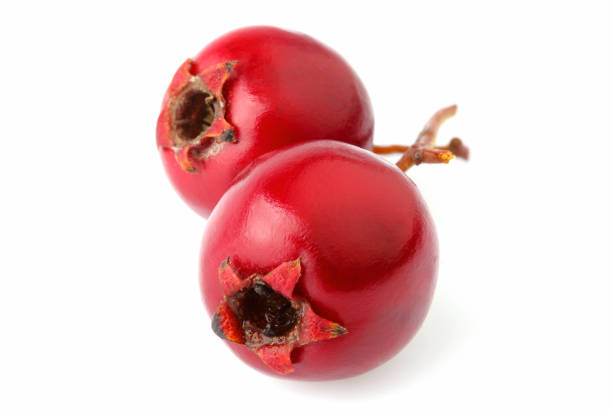
Loaded with antioxidants 
Loaded with antioxidants -
The anti-inflammatory effects of hawthorn berries may benefit your health. Chronic inflammation has been related to a variety of ailments, including type 2 diabetes, asthma, and some malignancies, according to research. In a study of mice with liver illness, hawthorn berry extract considerably reduced levels of inflammatory chemicals, resulting in less inflammation and harm to the liver.
In one study, researchers treated mice with respiratory problems with vitexin, a chemical found in hawthorn leaves. This medication lowered the synthesis of inflammatory chemicals as well as the response of white blood cells to inflammation. These encouraging findings from animal and test-tube research imply that the supplement may have anti-inflammatory properties in people. More research, however, is required.

May have anti-inflammatory properties 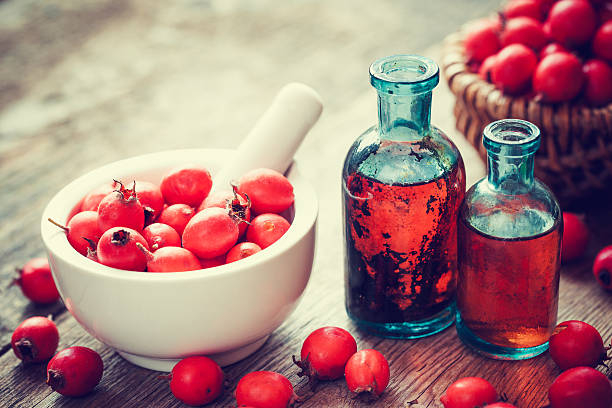
May have anti-inflammatory properties -
Hawthorn berry is one of the most widely suggested foods in traditional Chinese medicine to help treat high blood pressure. According to animal research, hawthorn can function as a vasodilator, which means it helps relax constricted blood vessels, decreasing blood pressure. In 10-week research, 36 patients with modestly raised blood pressure were given hawthorn extract.
The researchers discovered that those who took 500 mg of the extract daily had lower diastolic blood pressure – the figure at the bottom of a blood pressure reading. In a 2006 trial, 79 patients with type 2 diabetes and high blood pressure were given 1,200 mg of hawthorn extract every day for 16 weeks. People who took the extract had lower blood pressure readings than those who received a placebo. More research is needed to back up these conclusions. It's also worth noting that consuming berries is not the same as using an extract.

May lower blood pressure 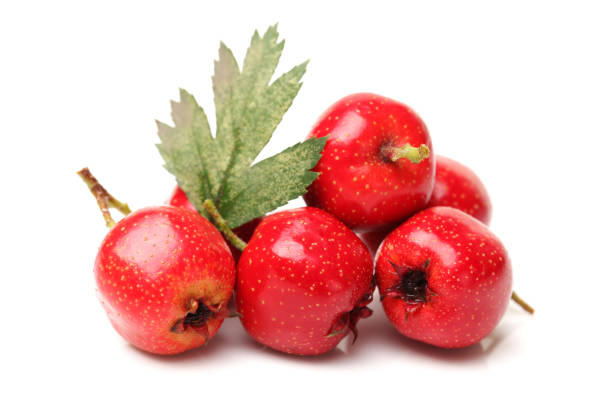
May lower blood pressure -
According to some studies, hawthorn extract may lower blood cholesterol levels due to its flavonoid and pectin content. A pectin is a form of fiber that aids in the metabolism of cholesterol. Atherosclerosis, or plaque buildup in your blood vessels, is exacerbated by unbalanced blood cholesterol levels, notably high triglycerides, and low HDL (good) cholesterol. If plaque continues to accumulate, it has the potential to totally block a blood vessel, resulting in a heart attack or stroke.
In one animal study, mice given two doses of hawthorn extract exhibited lower total and LDL (bad) cholesterol levels, as well as 28-47% lower liver triglyceride levels, as compared to mice given no extract. Similarly, rats receiving hawthorn berry supplements had considerably lower levels of fasting triglycerides and LDL (bad) cholesterol after 6-week research. Finally, 6-month research of 64 persons with atherosclerosis discovered that ingesting hawthorn extract at a dose of 2.3 mg per pound (5 mg per kg) of body weight reduced the thickness of dangerous plaque accumulation in the carotid artery. Though this study is encouraging, more human studies are needed to determine the effect of hawthorn extract on blood cholesterol levels.
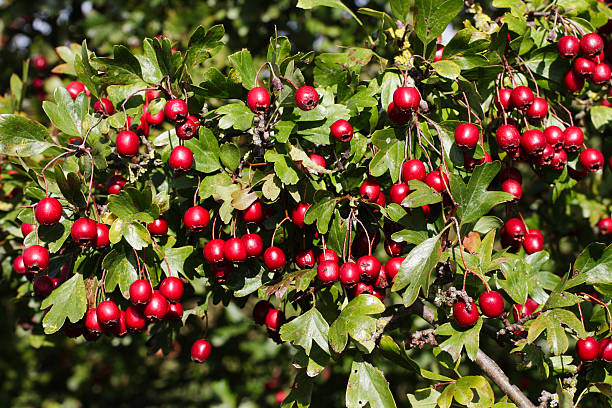
May reduce blood cholesterol levels 
May reduce blood cholesterol levels -
For millennia, people have utilized hawthorn berries and extract to cure digestive disorders, including indigestion and stomach pain. The fiber in the berries has been shown to improve digestion by reducing constipation and serving as a prebiotic. Prebiotics are nutrients that nourish and support healthy gut flora, which is essential for digestion. In one observational research of persons with sluggish digestion, each additional gram of dietary fiber taken was associated with a 30-minute reduction in the time between bowel movements.
To put it another way, the more fiber people consumed, the more regularly they pooped. Furthermore, a rat study discovered that hawthorn extract significantly shortened food transit time in the digestive system. With a shorter gut transit time, food travels more quickly through the digestive tract, perhaps alleviating indigestion. Furthermore, rat studies suggest that chemicals in hawthorn berries may boost the development and activity of digestive enzymes, namely those required for the digestion of fatty and protein-rich diets.

Used to aid digestion 
Used to aid digestion -
Hawthorn has been studied as a potential innovative therapy for anxiety disorders. In a previous trial of 264 anxious persons, a combination of hawthorn extract, magnesium, and California poppy flower dramatically lowered anxiety levels when compared to a placebo. However, it is unknown what part hawthorn played. When compared to typical anti-anxiety drugs, hawthorn appears to have fewer negative effects. That's one reason scientists keep looking into it as a possible treatment for central nervous system illnesses like anxiety and depression.
However, these investigations used a variety of hawthorn products rather than the berries themselves. More investigation is required. If you want to take a hawthorn supplement to help with anxiety, don't stop taking your current drugs, and consult with a healthcare expert first to ensure it's safe for you.

May reduce anxiety 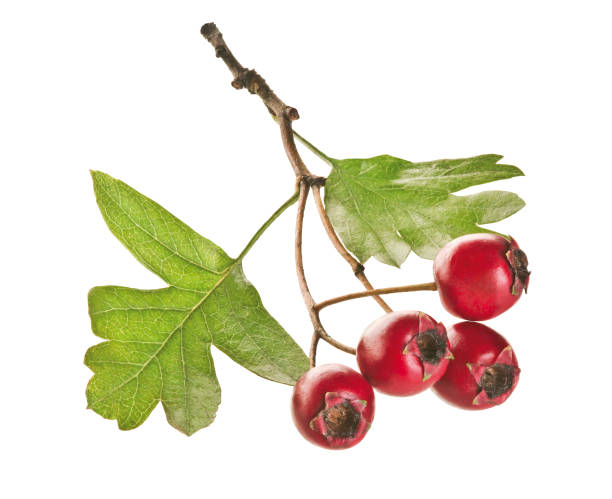
May reduce anxiety -
Hawthorn berry is best known for its historic usage in treating heart failure in conjunction with other conventional treatments. Heart failure occurs when the heart is unable to effectively pump blood. Several studies have suggested that hawthorn berries may have favorable effects in persons with heart failure without causing serious side effects. The majority of studies demonstrate improvements in heart function and symptoms of heart failure, such as shortness of breath and exhaustion.
Researchers believe that flavonoids found in hawthorn are responsible for these positive effects. However, there is some evidence that hawthorn may be hazardous in specific situations of heart failure. According to one study, taking it alongside conventional treatments increased the risk of heart failure progressing.
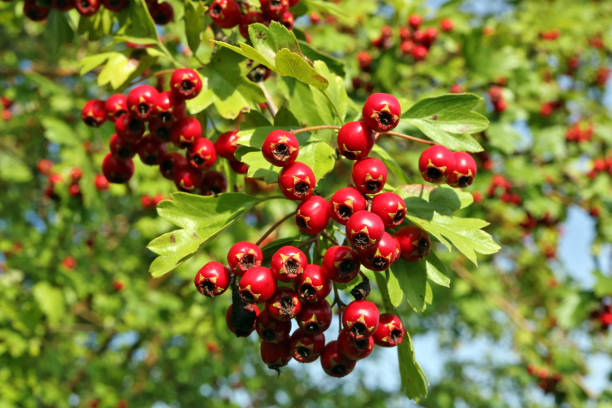
Used to treat heart failure 
Used to treat heart failure -
Hawthorn berries may help prevent premature skin aging caused by collagen degradation induced by overexposure to sunlight or UV light. A test-tube study discovered that a combination of hawthorn and ginseng extract could delay the appearance of wrinkles and increase skin hydration. According to research, this effect may be linked to the antioxidant content of the hawthorn fruit. Nonetheless, research in this field is limited, and more human studies are required.
Raw hawthorn berries have a tangy, somewhat sweet flavor that makes them an excellent on-the-go snack. However, avoid eating the seeds. They, like apple seeds, carry the poison cyanide. You can buy premade hawthorn tea or make your own using the plant’s dried berries, flowers, and leaves. Hawthorn berries can be fermented to generate a pleasant alcoholic beverage (for adults) or a flavorful vinegar for salad dressing.

May have anti-aging properties 
May have anti-aging properties





























